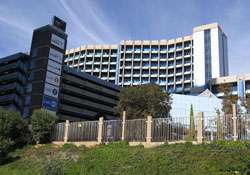SABC is key weapon in ANC's arsenal
For this ballot, the African National Congress (ANC) punted its "We have a good story to tell" line consistently, showing the progress made in 20 years. This approach is a no-brainer, as almost everyone's life is better than it was under apartheid.
It was also less defensive than its previous "Together we can move the country forward" slogan, an attempt to focus on their past rather than on future alternatives. Of course, if you focus on the past, you have to choose a version of it to suit your campaign. The ANC has been rewriting history to make it the only party of liberation, to suggest that it somehow magically delivered freedom like a gift from its run-down offices in Lusaka, and to limit anyone else's claim to have made even a modest contribution.
The DA approach
But voters, particularly young ones, are choosing who they can best trust with their future. At first, the Democratic Alliance (DA) attempted to tackle this by redefining itself and giving itself a struggle history, but that did not get far. More recently in the campaign, its line was that the ANC's present leadership could not be trusted.
Rather than attack the ANC and its history, it tactically - and some would say cynically - contrasted the present leadership with previous ANC figures. Interestingly, the DA was trying to embrace ANC history, though a different version of the one the majority party was brandishing.
The DA did not dwell on policy differences with the ANC, but on what it hoped would be seen as its more trustworthy leadership.
And the EFF approach
Economic Freedom Fighters was the party offering something substantively different, a radical economic policy - if the populist rhetoric it throws around amounts to a policy. It embraced the symbols of revolution, such as berets, red overalls and Maoist portraits, if not the substance.
And then there's Nkandla
All the opposition parties tried to make maximum use of the Nkandla scandal, handed to them on a plate by the investigative journalists who have stuck with this story for five years. It was the central media narrative of the election (when it could find space in between the Oscar Pistorius stories) and dominated coverage in the private media.
Some media tried to give attention to policy alternatives, and to speak to a range of ordinary voters, but Nkandla overshadowed the more cerebral stuff.
The fact that President Jacob Zuma and the ANC were able largely to brush aside the Nkandla issue makes one wonder how much clout the print media still have, given that this was a front-page story for months, one that could not be ignored even by the ANC-supporting media. It was revealing that Zuma said it was only the "clevers" who care about Nkandla, by which he might have meant the 25% or so who read daily newspapers.
The ANC's most powerful weapon

It is going to be hard to take Zuma seriously now on the issue of education, as he is so contemptuous of those who have it. But what Zuma is showing is that he knows that what matters for the ANC is not the commercial, print media, but the South African Broadcasting Corporation (SABC), which gets by far the biggest share of audience.
That is why the ANC has so much to say about the inadequacies of the print media, but is so silent on problems at the SABC, which can be relied on to block opposition adverts, play down Nkandla and pursue the ANC narrative. It is why it was prepared to lend R1.5bn to the SABC and give only a few million for the Media Development and Diversity Agency to support community media.
Technology - particularly SMSs and social media - increasingly allows the parties to talk directly to voters, without going through the conventional media. Social media would take off if the cost of bandwidth came down, allowing many more people to access the internet. Maybe that is why the government is so slow to take action to bring down the cost. Why weaken the SABC when it is one of your most potent weapons?
About Anton Harber
- Find bright new ways to connect to readers - 31 Jul 2015
- Publish and be damned in name of patriotism - 24 Apr 2015
- Criminal libel has no place in law books - 20 Mar 2015
- One step forwards, one back for democracy - 2 Mar 2015
- Investment in people keeps news groups afloat - 13 Feb 2015
View my profile and articles...